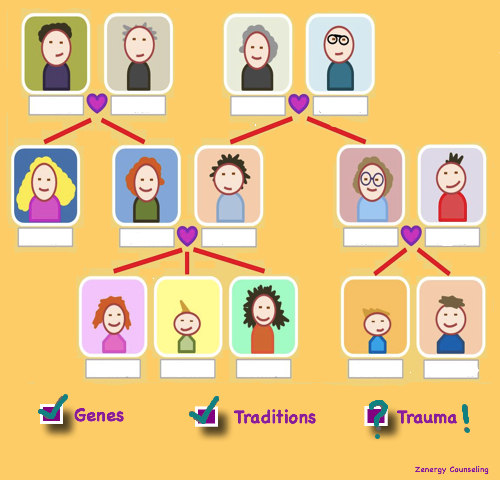How do you tie your shoelace? Who taught you? Do you know who taught them? Chances are that it was a parent or a family member who taught you just like they were taught by the generation before them. When we talk about family “inheritance,” we mostly assume money, traditions, or even genes but it can also include something more insidious – generational trauma.
What is generational trauma? Simply explained, it is trauma that is transferred over generations. Setting the nature vs nurture debate aside, mental health issues can be both inherited and taught by experiences. This is why a baby who may have never met you can feel extremely comfortable around you because of the number of positive interactions you had around the mother before the birth or you may notice the high anxiety in the baby because of possible negative environment that the mother may have experienced. What has happened to the mother now directly affects the newborn baby in their habits, interactions, and reactions.
Being someone of South Asian descent, I find myself extremely frustrated with the belief many hold regarding the definition of “strength.” I have been told way too many times that expressing my feelings in a manner that makes others feel uncomfortable equates to “not being strong.” This is a behavior that my family adopted from their parents, and they continued the practice with their children. Painful and traumatic experiences already isolate us- and to tell someone to basically stop showing “weakness” (read: emotions) is another way to isolate one further. By hiding our pain, we learn to accept certain behavior as part of our norm and pass it down as part of the tradition, especially if it is in families who accept “because I said so” as a reason.
It is difficult to accept that some of these traditions can cause Post Traumatic Stress Disorder (PTSD) in an individual and lead to unhealthy reactions toward others. Overseas it is not uncommon for the teachers to leave marks on their students as part of “discipline.” I recall memories of having marks on my arm from being hit with rulers and witnessing that ruler breaking into pieces as my teacher moved onto a friend. How fair is it to expect different behavior or assume that someone will know “better” when they grow up in an environment being suppressed by fear.
Many times, this isolation, this belief that prayer and “not thinking about ‘it’” can lead to extreme actions (i.e. suicide). The rate of domestic violence, substance abuse, addiction, etc is so high because we focus more on the symptoms than the underlying issues. So many times, we assume that if we create distance between the “problem” and ourselves, that we have solved the problem. Creating distance definitely helps, but giving nausea medication for a stomach bug only solves part of the issue- it does not cure the sickness. Our previous generations pass down these illnesses to us.
Many have changed. It took generations taking active steps to change the belief system and behavior. Are they always perfect? Nope. Are we perfect? Absolutely not. But we are moving forward in breaking the cycle of trauma.
I feel the need to repeat that there is no quick fix treatment for mental health. If there are, I am very skeptical of them. It takes time for trauma to heal in our system- from our bodies and mind. These can be a starting point:
- Set Boundaries.
We want to help our loved ones. We may see patterns that are damaging for them but we can’t force them to face their trauma. We are responsible for own healing and learning in order to set appropriate and healthy boundaries by creating the necessary distance.
- Do better when you know better.
If you catch yourself repeating unhealthy statements and actions, especially to the next generation because of the past generations, correct it; For example, you opened your mouth and your ‘parent’ came out. You absolutely hated it when your parent spoke to you like that and left you feeling horrible. Take a step back and acknowledge that it did just happen. If it left you feeling awful, chances are that it is making the other person feel horrible too. Discussing and clarifying behavior expectations and agreeing on accepted behaviors will improve the relationship.
- Journal
Note the positives and negatives because change is not easy. You can include your reasons for wanting the change and your experiences. Initially, you may notice mostly difficult experiences but slowly you will start noticing your path to achieving your goals through writing. This experience can help you stay more grounded, especially on those bad days.
- Seek treatment
I know many times the idea of seeking medication can be tempting but it may not be the best long-term solution. Let’s take an example of someone who has gone through an accident and is unable to physically move on their own. Medication is prescribed to help ease the pain but physical therapy is needed to help the individual return to as close to baseline as possible. Sometimes through this support, we can even accomplish more than before.
Healing from trauma, especially generational trauma, can be difficult because it is so entrenched in our family history… but healing is not impossible. Having support, whether it is with friends and/or professional team, by reaching out and being open to talk and explore the trauma is helpful in this process. Let’s end the stigma associated with mental health and create a community of support by being vulnerable to explore the depths of ourselves.

